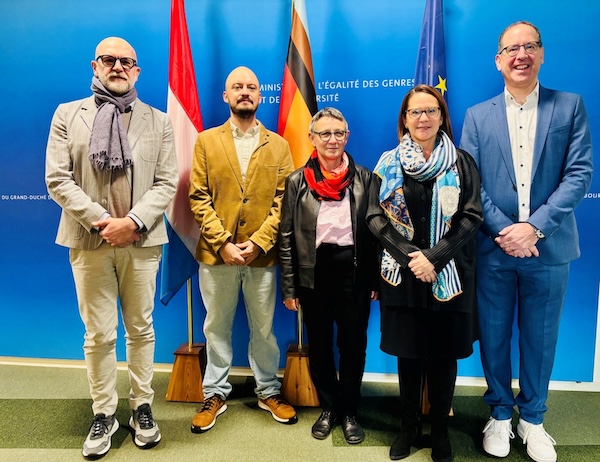 (L-R) Ralph Kass, MEGA; Kim Meyer, Ministry of National Education, Children and Youth; Karin Weyer, Director of respect.lu; Yuriko Backes, Luxembourg Minister for Gender Equality and Diversity; Luc Pauly, Fondation Follereau Luxembourg;
Credit: MEGA
(L-R) Ralph Kass, MEGA; Kim Meyer, Ministry of National Education, Children and Youth; Karin Weyer, Director of respect.lu; Yuriko Backes, Luxembourg Minister for Gender Equality and Diversity; Luc Pauly, Fondation Follereau Luxembourg;
Credit: MEGA
On Monday 17 November 2025, Luxembourg’s Ministry of Gender Equality and Diversity (MEGA) announced the official launch of the “Zivilcourage im Netz” project in collaboration with respect.lu - Centre against Radicalisation.
The project will begin in a pilot format in 2026 with the aim of promoting respect, civic responsibility and diversity in online communication, as well as combating the spread of hate speech on social media and in Luxembourg’s digital spaces.
At the signing of the cooperation agreement, Minister Yuriko Backes stated: “In the context of the backlash against human rights, including the rights of women and LGBTIQ+ communities, it is imperative to respond with strategies to counter hate speech, which often constitutes fertile ground for hate crimes. By seeking cooperation with respect.lu, MEGA is firmly committing itself to a new area of action to contribute to social cohesion and respect within our society.”
The ministry added that the initiative builds on discussions held following anti-LGBTIQ+ petition No. 3198, which brought together stakeholders in November 2024, including the police, public prosecutor’s office, LGBTIQ+ associations, BEE SECURE and respect.lu, to develop a coherent strategy to address online hate.
Based on the values of respect, tolerance, openness, diversity, inclusion and a humanist approach, the project aims to encourage civic responsibility on social media, promote respectful communication online, support individuals whose participation in public debate is threatened and provide tools for communities to develop counter-narratives to hate speech. It will also contribute to efforts to combat gender-based violence and violence targeting LGBTIQ+ people, particularly when amplified through new technologies.
“Hate speech acts as a catalyst for polarisation and radicalisation. Its normalisation and amplification undermine social cohesion and pose a threat to democracy. It is essential to combat hateful speech at every level of society,” emphasised Karin Weyer, director of respect.lu.
The project primarily targets young people aged sixteen to 30, including pupils, students and young adults, as well as educators, civil society actors and adults committed to fostering respectful online communication. Its initial phase will consist of a dedicated website and awareness campaign designed to support initiatives related to digital civic courage and to provide a platform for individuals who are exposed to, and wish to take a stand against, hateful online content.









